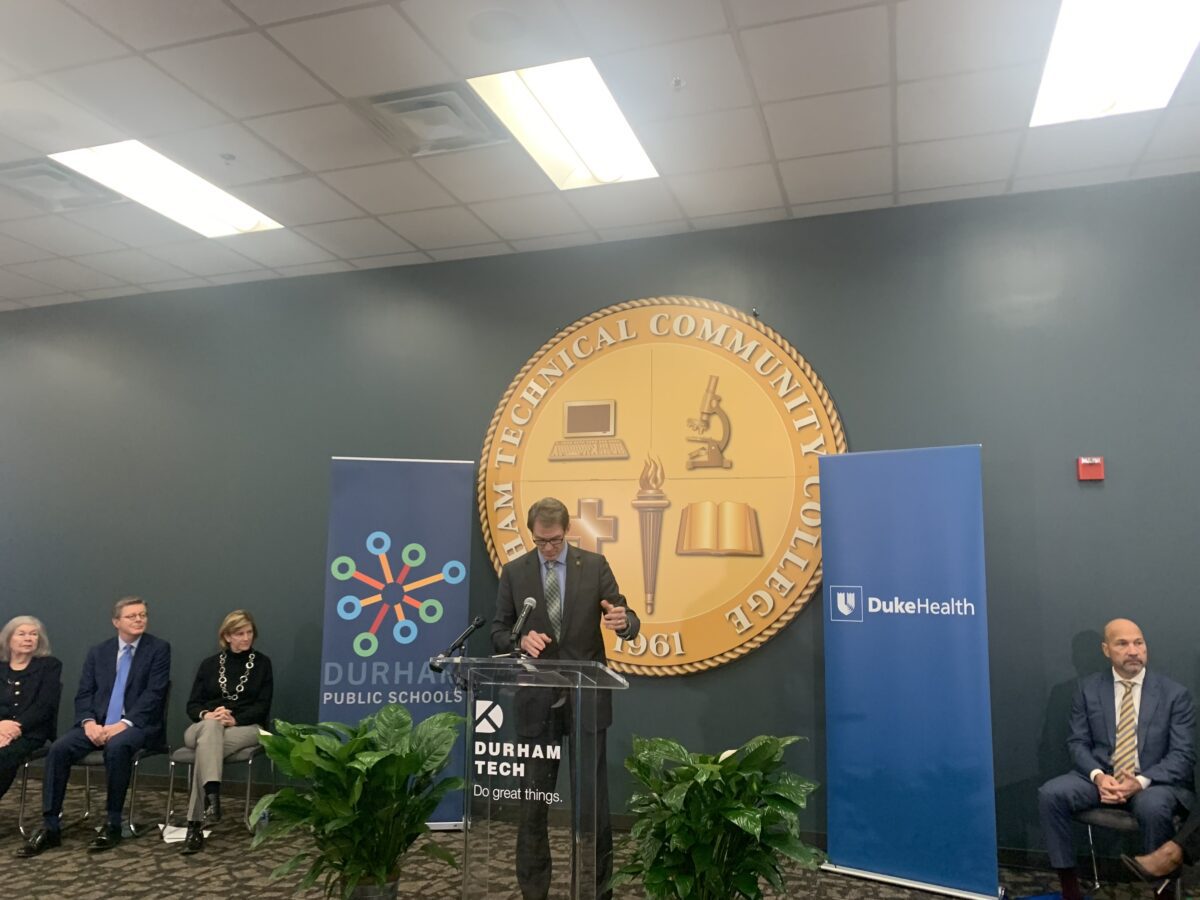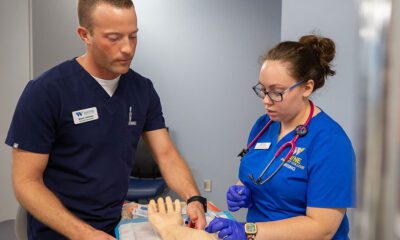
Share this story
- “Durham deserves a health care talent force that reflects its beautiful community," @DukeHealth CEO Craig Albanese said after announcing a grant and partnership with @durhamtech, @DurhamPublicSch, and @BloombergDotOrg.
- Some Durham Public Schools students will soon be able to leave high school with over 60 college credits and key connections and certifications in the medical field. Read more about the partnership including Duke Health, Durham Tech, and Bloomberg here.
|
|
Duke University Health System, Durham Technical Community College, and Durham Public Schools (DPS) announced plans Wednesday to establish an early college for high school students in the district who are interested in health care careers.
A $29.5 million grant from Bloomberg Philanthropies is funding the project. The program is intended to be a direct pathway to careers in Duke Health facilities and to provide another option to students besides the four-year college route.
At the beginning of the 2025-26 school year, Durham Tech will welcome 100 ninth graders into a newly renovated building on their campus. Leaders hope the program can help remedy labor shortages and health equity problems in the long term.
“This initiative reflects Duke’s broad commitment to forging partnerships to support strategic community priorities such as college and career readiness. Through Bloomberg Philanthropies’ generosity, this innovative model of collaboration will provide significant opportunities for young people to be prepared as the next generation of leaders in health care as well as advance the overall wellbeing of the communities,” Stefanie Williams, vice president for community affairs at Duke University, said in a statement.
The partnership provides training for careers in nursing, allied health, surgical tech, and clinical research.
Students are able to apply to the early college through the DPS lottery.
Through early college, students in grades 9-12 will be dual-enrolled in Durham Tech and Durham Public Schools. Early colleges, known as Cooperative Innovative High Schools in North Carolina, are small public high schools located on the campus of a university or community college. They target students at risk of dropping out of high school, first-generation college students, first generation college students, and students who may benefit from accelerated learning opportunities. As of today, North Carolina has 123 funded partnerships for their 134 Cooperative Innovative High Schools.
The Middle College at Durham Tech expands into the early college high school, serving grades nine through twelve with an option to pursue a 13th year. It will be run by a combination of teachers, a principal, support staff, student services, and curricula resources from Durham Public Schools, with assistance from the community college.
April Thompson, the director of choice and innovation for Durham Public Schools, said that guidance and mentorship from staff at all three institutions will help students stay on a four-year graduation track as they complete the rigorous coursework at the early college.
Students are also able to complete a fifth year if needed, at no cost to the student’s family.
“Students will be able to take their high school classes along with college-level courses that may supplant some of their high school classes, and give them more opportunities to take courses while they’re in college and going toward their pathway,” Thompson said. “So there will be support along the way through the community partners, our schools, and Durham tech.”
Along with their high school diploma and college credits, early college graduates are expected to have at least one credential to fill “high-demand positions.” These could include certified nursing assistants, emergency medical technicians, phlebotomists, and central sterile processing technicians.
Duke University President Vincent E. Price said they are grateful to Bloomberg Philanthropies for supporting the chance to create compelling opportunities for Durham students and to address workforce shortages.
“This exciting new partnership encompasses education, research, patient care, and community enhancement to advance a bold and innovative healthcare education model for Durham,” Price said.
According to a dashboard from the Health Resources and Services Administration, North Carolina has 188 primary health care shortage areas. Duke University Health System (DUHS) plans to hire at least 60 students directly after graduation.
Craig Albanese, chief executive officer of DUHS, said that last year they had almost 5,000 nursing openings, 1,300 openings for nursing care assistants, and hundreds more openings for imaging, sterile processing, and surgical technicians.
Albanese said that the mentorship, networking, apprenticeships, and clinical rotations students will receive will well develop Durham’s “talent” force.
“Durham deserves a health care talent force that reflects its beautiful community,” Albanese said. “Research has consistently demonstrated that patient care is better when health care teams mirrored the diversity of the community — access (to care) outcomes and health care experience all improve.”
The Durham community is one of 10 grant awardees across the nation for Bloomberg Philanthropies’ “student-centered, market-driven healthcare education Initiative.”





